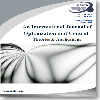Active Unmatched Disturbance Cancellation and Estimation by State–Derivative Feedback for Plants Modeled as an LTI System
Active Unmatched Disturbance Cancellation and Estimation by State–Derivative Feedback for Plants Modeled as an LTI System
___
- Arslan Y.Z., Sezgin A.,& Yagiz N.(2015). Improving the ride comfort of vehicle passenger using fuzzy sliding mode controller. Journal of Vibration and Control, 21(9), 1667–1679.
- Marconi, L., Isidori A., & Serrani, A. (2002). Autonomous vertical landing on an oscillating platform: an internal-model based approach. Automatica, 38(1), 21–32.
- Basturk, H. I., & Krstic,M. (2013). Adaptive wave cancellation by acceleration feedback for rampconnected air cushion-actuated surface effect ships. Automatica, 49(9), 2591–2602.
- Basturk, H. I., Rosenthal, B., & Krstic, M. (2103). Pitch control design for tandem lifting body catamaran by aft lifting body actuation. IEEE Transactions on Control Systems Technology, 23(2), 700–707.
- Johnson, C. D. (1971). Accommodation of external disturbances in linear regulator and servomechanism problems. IEEE Transactions on Automatic Control, 16(6), pp. 635–644.
- Francis, D. A., & Wonham, W. N. (1975). The internal model principle for linear multivariable regulators. Applied Mathematics and Optimization, 2(2), 170–194.
- Dogruel, M., & Celik, H. H. (2011). Harmonic control arrays method with a real time application to periodic position control. IEEE Transactions on Control Systems Technology, 19(3), 521–530.
- Kim, H., & Shim, H. (2015) “Linear systems with hyperbolic zero dynamics admit output regulator rejecting unknown number of unknown sinusoids,” IET Control Theory and Applications, 9 , pp. 1472 - 1480, 2015.
- Marino, R., & Santosuosso, G. L. (2007). Regulation of linear systems with unknown exosystems of uncertain model. IEEE Transactions on Automatic Control, 52(2), 353–359.
- Bodson. M., & Douglas, S. (1997) Adaptive algorithms for the rejection of sinusoidal disturbances with unknown frequency. Automatica, 33(12), 2213–2221.
- Bobtsov A. A., & Pyrkin, A. A. (2009). Compensation of unknown sinusoidal disturbances in linear plants of arbitrary relative degree. Automation and Remote Control, 70(3), 449–456.
- Marino, R., & Tomei, P. (2005). Adaptive tracking and disturbance rejection for uncertain nonlinear systems. IEEE Transactions on Automatic Control, 50(1), 90–95.
- Marino, R., & Santosuosso, G. L. (2005). Global compensation of unknown sinusoidal disturbances for a class of nonlinear nonminimum phase systems. IEEE Transactions on Automatic Control, 50(11), 1816– 1822.
- Nikiforov, V. O. (2001). Nonlinear servocompensation of unknown external disturbances. Automatica, 37(10), 1617–1653.
- Ding, Z. (2003). Universal disturbance rejection for nonlinear systems in output feedback form. IEEE Transactions on Automatic Control, 48(7), 1222–1227.
- Kwak, S. K., Washington G., & Yedavalli, R. K. (2002) Acceleration-based vibration control of distributed parameter systems using the ’reciprocal state-space framework. Journal od Sound and Vibration, 251(3), 543–557.
- Abdelaziz, T. H. S. (2008). Robust pole assignment for linear time-invariant systems using state-derivative feedback. Journal of Systems and Control Engineering, 223(2), 187–199.
- Michiels, W., Vyhl´ıdal, T., Huijberts, H., & Nijmeijer, H. (2009) Stabilizability and stability robustness of state derivative feedback controllers. SIAM Journal on Control and Optimization, 47(6), 3100–3117.
- Basturk, H. I., & Krstic, M. (2013). Adaptive cancelation of matched unknown sinusoidal disturbances for LTI systems by state derivative feedback. Journal of Dynamic Systems, Measurement, and Control, 135(1), 014501–014507.
- Basturk, H. I., & Krstic, M. (2012) Adaptive backstepping cancelation of unmatched unknown sinusoidal disturbances for LTI systems by state derivative feedback. ASME Dynamic Systems and Control Conference, 1-9.
- Basturk, H. I. (2015). Observer based adaptive estimation/cancellation of unmatched sinusoidal disturbances in known LTI systems by state derivative measurement. ASME Dynamic Systems and Control Conference, 2015.
- Nikiforov, V. O. (2004). Observers of external deterministic disturbances. I. objects with known parameters. Automation and Remote Control, 65(10), 1531– 1541.
- Chen, C. T. (1984) Linear System Theory and Design. Rinehart, Winston. New York, NY: Holt.
- Salem, A., & Said, K. (2008). A simple proof of Sylvester’s (Determinants) Identity. Applied Mathematical Sciences, 32(2), 1571–1580.
- Ioannou, P., & Sun, J. (1996) Robust Adaptive Control. Prentice-Hall.
- Kokotovic, P.V. (1990). The joy of feedback: nonlinear and adaptive. IEEE Control Systems Magazine, 12(3): 717.
- Krstic M., Kanellakopoulos I., & Kokotovic, P. (1995) Nonlinear and Adaptive Control Design, Wiley.
- ISSN: 2146-0957
- Yayın Aralığı: 4
- Yayıncı: Prof. Dr. Ramazan YAMAN
A simulation algorithm with uncertain random variables
Hermite collocation method for fractional order differential equations
Nilay AKGÖNÜLLÜ PİRİM, Fatma AYAZ
A conformable calculus of radial basis functions and its applications
Optimization of lactic acid bacteria viability using fuzzy soft set modelling
Nihal YILMAZ ÖZGÜR, Nihal TAŞ, Reyhan İRKİN
Sinc-Galerkin method for solving hyperbolic partial differential equations
Finite element-based hybrid techniques for advection-diffusion-reaction processes
Multiobjective PID controller design for active suspension system: scalarization approach
Dynamic scheduling with cancellations: an application to chemotherapy appointment booking
